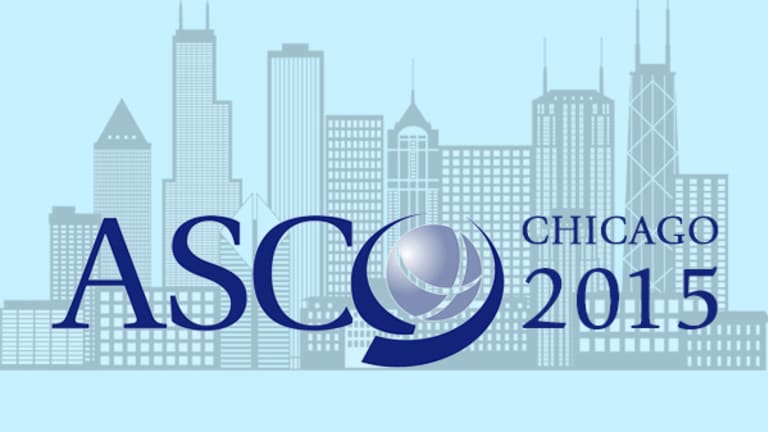
10 Important Checkpoint Inhibitor Cancer Drug Abstracts from ASCO '15
CHICAGO (The Street) -- For the past few years, the American Society of Clinical Oncology (ASCO) annual meeting has been dominated by cancer immunotherapy -- drugs which activate the body's own immune system to identify and kill cancer cells. In particular, the class of immune-stimulating drugs known as checkpoint inhibitors (also known as PD-1 and PD-L1 inhibitors) has dominated the ASCO spotlight.
This year's ASCO meeting will be no different, except the two leading checkpoint inhibitors -- Merck's (MRK) Keytruda and Bristol-Myers Squibb's (BMY) Opdivo -- have both already secured U.S. approval for skin cancer. Opdivo is also approved in lung cancer and Keytruda is under FDA review for same. There is a lot of clinical work being done to expand the use of checkpoint inhibitors into other forms of cancers, too.
What follows is a quick scan and summary of the ASCO research abstracts released Wednesday night focused on studies of checkpoint inhibitors. In addition to Bristol and Merck, noteworthy data is also being released from Roche (RHHBY) , AstraZeneca (AZN) and Pfizer (PFE) .
This is not a complete summary of all checkpoint inhibitor data at this year's ASCO meeting, just a taste. And remember, data found in abstracts released Wednesday night are often preliminary, to be updated at the ASCO meeting beginning on May 29.
Merck
Abstract 8011 describes a phase I study (Keynote-021) of Keytruda (pembrolizumab) plus Yervoy in patients with second-line non-small cell lung cancer. Seventeen patients were enrolled and treated with three different dose regimens of Keytruda/Yervoy.
Overall response rate for 11 evaluable patients was 55% (1 complete response, 4 partial responses.) In five evaluable patients treated at the lowest doses, the overall response rate was 60% (3 partial responses.)
Abstract 3009 is a phase I study combining Keytruda and low-dose Yervoy in patients with melanoma and kidney cancer. Responses were observed in both melanoma and kidney cancer patients but the abstract lacks details. Dose-limiting toxicities (all grade 3) were seen in 6 of 19 enrolled patients.
Merck is studying Keytruda in combination with currently approved drugs for newly diagnosed non-small cell lung cancer patients. Abstract 8031 contains preliminary data from the Keynote-021 study, which combines Keytruda with the chemotherapy doublet carboplatin and paclitaxel (Arm A, 20 patients) and Keytruda plus carboplatin, paclitaxel and Alimta (Arm C, 24 patients.)
The preliminary response rate in Arm A was 30%, in Arm C it was 58%. Grade 3-4 adverse event rate was 38% in Arm C. The abstract says additional patients are being enrolled in the Arm C regimen based on "promising" overall response rate.
Abstract 5510 describes a phase I study of Keytruda in patients with PD-L1-positive, advanced ovarian cancer. Twenty-six patients were enrolled. The best overall (confirmed) response to Keytruda was 11.5% (one complete response, two partial responders.) All three patients remained in response for more than 24 weeks at the time of the analysis. Another six patients had stable disease.
Keytruda late-breaker abstracts not released Wednesday night include data in colorectal cancer (abstract LBA100) and head and neck cancer (abstract LBA6008.)
Roche/Genentech
So much of the early clinical development of checkpoint inhibitors is done with non-randomized studies, so it's nice to see a classic Genentech, randomized phase II study involving its lead drug MPDL3280A versus docetaxel summarized in abstract 8010.
The POPLAR study enrolled 287 patients with previously treated non-small cell lung cancer and randomized them to treatment with '3280A or docetaxel. The patients were further subdivided by the level of PD-L1 expression in their tumors.
The abstract includes an interim analysis showing a 22% reduction in the risk of death (Hazard Ratio 0.78) favoring '3280A over docetaxel for all patients enrolled. At the median, the overall survival was 11.4 months for '3280A-treated patients compared to 9.5 months for docetaxel patients but the difference was not statistically significant owing to the relatively small number of patients enrolled. The survival trend favoring '3280A was greatest (but still not statistically significant) in patients with the highest level of PD-L1 expression in their tumors.
Based in part on these data, Roche/Genentech is running six phase III studies of '3280A in lung cancer.
Abstract 8030 describes a phase I study of MPDL3280A plus various doublet chemotherapies regimens in patients with newly diagnosed non-small cell lung cancer. Thirty patients were evaluable for efficacy, with a best overall response rate of 67% across all arms of the study. For patients treated with MPDL3280A plus carboplatin and Alimta, the response rate was 75%.
One patient in this arm of the study died due to an infection after prolonged low white blood cell counts.
Bristol-Myers Squibb
Abstract 8009 describes the results of the phase III "Checkmate 017" study comparing Opdivo against docetaxel in patients with previously treated (second line), squamous non-small cell lung cancer. Results: Opdivo demonstrated a statistically significant 41% reduction in the risk of death compared to docetaxel. At the median, overall survival was 9.2 months versus 6 months favoring Opdivo.
One Bristol ASCO abstract of note? What? Rest assured, Bristol has a lot more cooking at the biggest cancer research meeting of the year. Most of Bristol's checkpoint data this year is still cordoned off as late-breaker abstracts which won't be disclosed until the meeting in two weeks.
These late-breaker abstracts include new Opdivo data in liver (Abstract LBA101), lung (Abstract LBA109) and skin cancer (Abstract LBA1 at the meeting's plenary session.)
Pfizer
Avelumab is the checkpoint inhibitor in clinical development via a partnership between Pfizer and Merck KGaA. Abstract 5509 describes a phase I study of avelumab in patients with recurrent or refractory ovarian cancer. Twenty-five patients were enrolled, with 23 patients evaluable for response.
The best overall response to avelumab was 17.4% (unconfirmed partial response) with another 48% of patients achieving stable disease. Median progression-free survival was 11.9 weeks. The most common adverse events reported were fatigue, nausea and diarrhea.
Abstract 8034 contains data from a phase I study of avelumab in 184 non-small cell lung cancer patients with progressive disease following platinum-based chemotherapy.
The unconfirmed response rate was 12% (1 complete response, 21 partial responses) with stable disease in 38% of patients. Median progression-free survival was 11.6 weeks.
AstraZeneca
Abstract 3014summarizes a phase I study combining AstraZeneca's PD-L1 inhibitor MEDI4736 combined with the anti-CTLA-4 antibody tremelimumab for the treatment of advanced non-small cell lung cancer. Sixty-one patients were treated, of which 31 were evaluable for efficacy.
The partial response rate was 26%, another 11% of patients had stable disease. Numerous dose combinations were studied, although a maximum tolerated dose has not yet been established. Eighteen percent of patients had adverse events which caused drug discontinuation. One patient died from polymyositis (inflammation of the muscles.)
Adam Feuerstein writes regularly for TheStreet. In keeping with company editorial policy, he doesn't own or short individual stocks, although he owns stock in TheStreet. He also doesn't invest in hedge funds or other private investment partnerships. Feuerstein appreciates your feedback; click here to send him an email.












